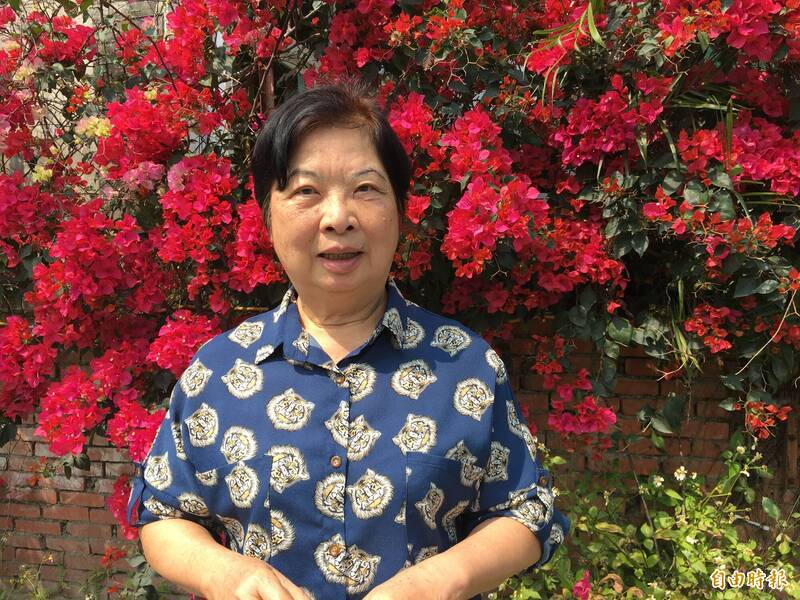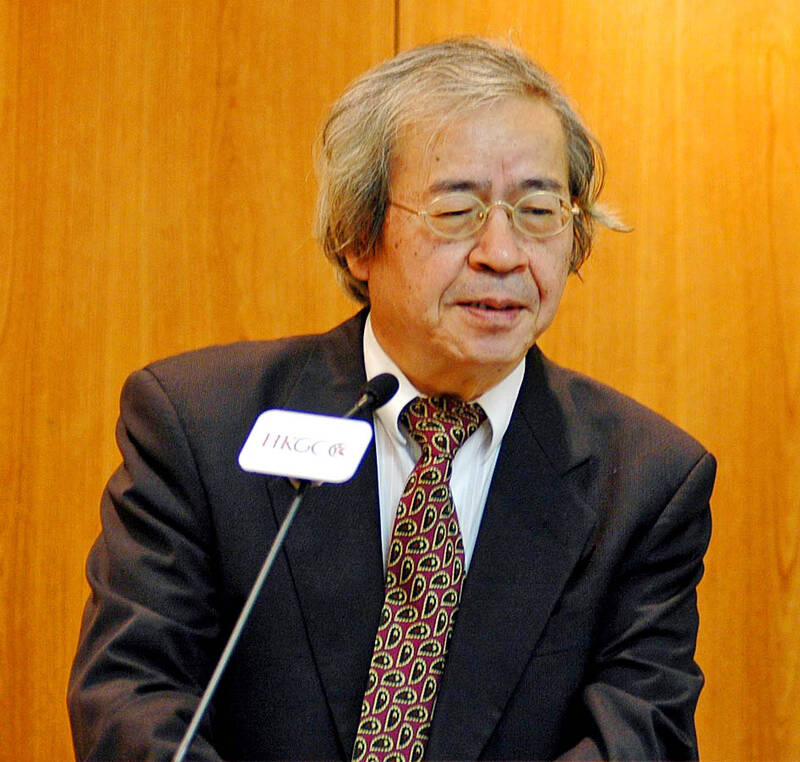Chen Wan-chen (陳婉真), a former legislator and Taiwanese independence activist, died of cancer yesterday morning at a hospital in Chiang Mai, Thailand.
She was 75 years old.
The Taiwan Transitional Justice Association, a non-governmental organization founded by Chen in 2016, yesterday mourned her death.

File photo: Liberty Times
Lu Chien-hsing (呂建興), a board member of the association who goes by the pseudonym Lu Yu (呂昱), said Chen had been undergoing cancer treatment for an extended period.
Chen’s friend Lee Kuan-ling (李冠伶) said Chen appeared strong and remained upbeat around others, making it difficult for many to tell she was ill.
Writer Hsieh Chien-ping (謝建平) wrote on Facebook that Chen was “the bravest female warrior in Taiwan’s founding,” wishing she would “forever protect this beautiful country.”

Photo: CNA
Chen worked as a journalist in the 1970s, covering the Taiwan Provincial Council — which became obsolete in 1998 — and developed an interest in Taiwan’s democratic movement.
She was blacklisted for her political activities and barred from returning to Taiwan by the then-Chinese Nationalist Party (KMT) government in 1979.
She returned to Taiwan in 1989 for Deng Nan-jung (鄭南榕) funeral.
In 1992, Chen ran for legislator representing the Democratic Progressive Party (DPP) in then-Taipei County (now New Taipei City) and was elected.
However, she was expelled from the DPP in 1997 for slandering party members.
In 1998, she ran for legislator for the New National Alliance, but was not elected.
Chen then focused on cultural and historical work, while continuing her social activism.
In other news, political commentator Nan Fang Shuo (南方朔), a cofounder of the political weekly The Journalist, (新新聞), has died at 78, said Chen Hao (陳浩), a reporter and former colleague at the Chinese-language China Times.
In a Facebook post on Tuesday evening, Chen lamented the death of Nan Fang Shuo, whose real name was Wang Hsing-ching (王杏慶), saying that he had passed away peacefully at 1:45pm on Monday.
Chen said he had visited Wang’s mourning hall to pay his respects on Monday, adding that he and many of Wang’s friends were surprised by the news and saddened at his passing.
While Chen did not disclose the cause of death, local news media reports said that the political commentator died of pneumonia. As of press time last night, Wang’s family had not commented on his death.
Lo Mei-ling (羅玫玲), a veteran in the publishing industry, said that Wang had a stroke some time ago and had been in poor health ever since, adding that her father and Wang were once hospitalized in the same facility around the same time.
Born in 1946, Wang had a master’s degree in forestry from National Taiwan University and a doctorate in economic planning from Chinese Culture University.
Wang worked as a reporter, column section chief, associate editor and editor-in-chief at China Times before establishing The Journalist in 1987 with fellow political commentators Wang Chien-chuang (王健壯), Antonio Chiang (江春男) and Chou Tien-jui (周天瑞).
Launched prior to the lifting of martial law in September 1987, the magazine sought to be a flag-bearer for a free press, democracy and social justice, in addition to providing “a voice that Taiwan cannot be without.”
After being informed of Wang’s death, Chiang and Chou said they were too upset to talk to the media.
Titian Publishing Co said Wang tried his best to fight the political system by planning and participating in street movements.
A heavyweight in Taiwan’s political and cultural arena, Wang understood well the pulse of society and provided the younger generation with vital support, it said.
Columnist Tsai Chi-ta (蔡其達) likened Wang to Prometheus in Greek mythology, who defied the Olympian gods by taking fire from them and giving it to humanity in the form of technology, knowledge and, more generally, civilization.
Wang lit the candle of life in his era, Tsai said, adding that history would never forget him.

A preclearance service to facilitate entry for people traveling to select airports in Japan would be available from Thursday next week to Feb. 25 at Taiwan Taoyuan International Airport, Taoyuan International Airport Corp (TIAC) said on Tuesday. The service was first made available to Taiwanese travelers throughout the winter vacation of 2024 and during the Lunar New Year holiday. In addition to flights to the Japanese cities of Hakodate, Asahikawa, Akita, Sendai, Niigata, Okayama, Takamatsu, Kumamoto and Kagoshima, the service would be available to travelers to Kobe and Oita. The service can be accessed by passengers of 15 flight routes operated by

Alain Robert, known as the "French Spider-Man," praised Alex Honnold as exceptionally well-prepared after the US climber completed a free solo ascent of Taipei 101 yesterday. Robert said Honnold's ascent of the 508m-tall skyscraper in just more than one-and-a-half hours without using safety ropes or equipment was a remarkable achievement. "This is my life," he said in an interview conducted in French, adding that he liked the feeling of being "on the edge of danger." The 63-year-old Frenchman climbed Taipei 101 using ropes in December 2004, taking about four hours to reach the top. On a one-to-10 scale of difficulty, Robert said Taipei 101

Taiwanese and US defense groups are collaborating to introduce deployable, semi-autonomous manufacturing systems for drones and components in a boost to the nation’s supply chain resilience. Taiwan’s G-Tech Optroelectronics Corp subsidiary GTOC and the US’ Aerkomm Inc on Friday announced an agreement with fellow US-based Firestorm Lab to adopt the latter’s xCell, a technology featuring 3D printers fitted in 6.1m container units. The systems enable aerial platforms and parts to be produced in high volumes from dispersed nodes capable of rapid redeployment, to minimize the risk of enemy strikes and to meet field requirements, they said. Firestorm chief technology officer Ian Muceus said

MORE FALL: An investigation into one of Xi’s key cronies, part of a broader ‘anti-corruption’ drive, indicates that he might have a deep distrust in the military, an expert said China’s latest military purge underscores systemic risks in its shift from collective leadership to sole rule under Chinese President Xi Jinping (習近平), and could disrupt its chain of command and military capabilities, a national security official said yesterday. If decisionmaking within the Chinese Communist Party has become “irrational” under one-man rule, the Taiwan Strait and the regional situation must be approached with extreme caution, given unforeseen risks, they added. The anonymous official made the remarks as China’s Central Military Commission Vice Chairman Zhang Youxia (張又俠) and Joint Staff Department Chief of Staff Liu Zhenli (劉振立) were reportedly being investigated for suspected “serious